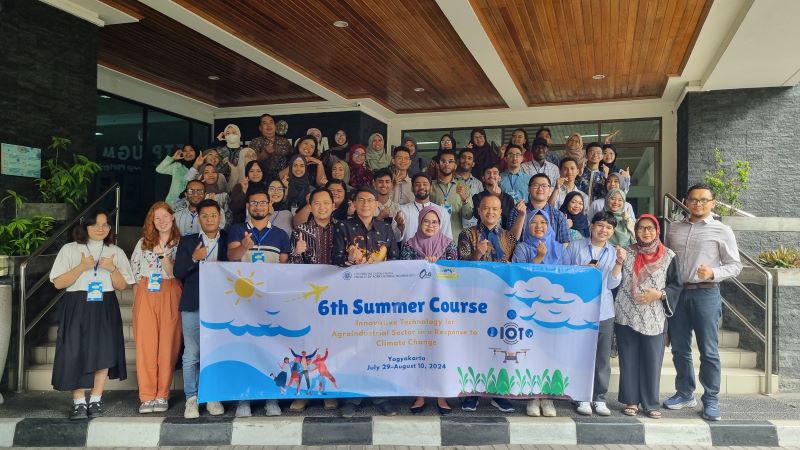
This morning, August 4th 2024, at 10.30 Western Indonesia Time (GMT+7), marked the official opening ceremony of the Summer Course (SC) 2024 held by the Faculty of Agricultural Technology, Universitas Gadjah Mada.
Dr Agung Putra Pamungkas delivered an opening speech welcoming all the participants from over 15 countries. This year, the SC 2024 carries a theme: Adaptive Technology for Sustainable Agroindustrial Sector in a Response to Climate Change. SC 2024 is a hybrid course consisting of two sessions: pre-course (asynchronous) and course (synchronous). All participants have undergone the pre-course sessions for the last five days from July 29th to August 2nd 2024. During the next seven days, from August 4th to August 10th 2024, the participants will go through course sessions consisting of lectures and trips to the field research station. He hoped the participants would enjoy a productive learning experience on several topics, ranging from on-farm technologies, agroforestry, food processing, food waste recycling and sustainable supply chains.
Dr Wiratni Budhijanto, the Secretary of the Directorate of Partnerships and Global Relations UGM, also gave an opening speech to welcome the participants. She also mentioned the unique position of UGM in Yogyakarta. She hinted at the community’s wisdom in tackling problems of agriculture and climate change using different perspectives: technological, cultural and even spiritual. She also spoke briefly about sharing knowledge, making memories, friendships and possible collaborations in the future.
Professor Dr. Yudi Pranoto, S.T.P., M.P., the Vice Dean of Academic and Student Affairs, Faculty of Agricultural Technology (FAT) UGM, welcomed the participants and officially opened the Summer Course 2024. He also elaborated on the many academic activities in FAT UGM, committing to learning, research and community service excellence.
Two online lectures followed the opening ceremony. The first lecture was on Fecal Microbiota Transplantation (FMT) for Livestock Animals Wellbeing, moderated by Putrika Citta Pramesi, M.Sc. from FAT UGM. Dr Jahidul Islam, Associate Professor from Tohoku University Japan, explained the FMT technologies to alleviate disease incidence and reduce antibiotic usage for curing diseased calves. He elaborated on the possible delivery mechanism of FMT using formulated prebiotics, which can alter dysbiosis in calves. The FMT implementation aimed to restore the balance of gut microbiota and improve the health status of livestock animals.
The second lecture was on Carbon Measurement for Mitigating Climate Change, moderated by Dr Ahdiar Fikri Maulana from Vocational College UGM. Dr Rebecca Hood-Nowotny from BOKU Vienna, Austria, described the essentials of soil as the medium to store carbon. Carbon, in the form of carbon dioxide and methane, contributes to climate change. The biotic elements, such as plants, bacteria and fungi, convert the labile pool of carbon into a stable pool using a mechanism called carbon entombing. She elaborated more on the biotic-mediated contribution of carbon pumps to storing carbon in the soil. Finally, she explained how to increase soil health while also improving the carbon storage in the soil using biochar.
